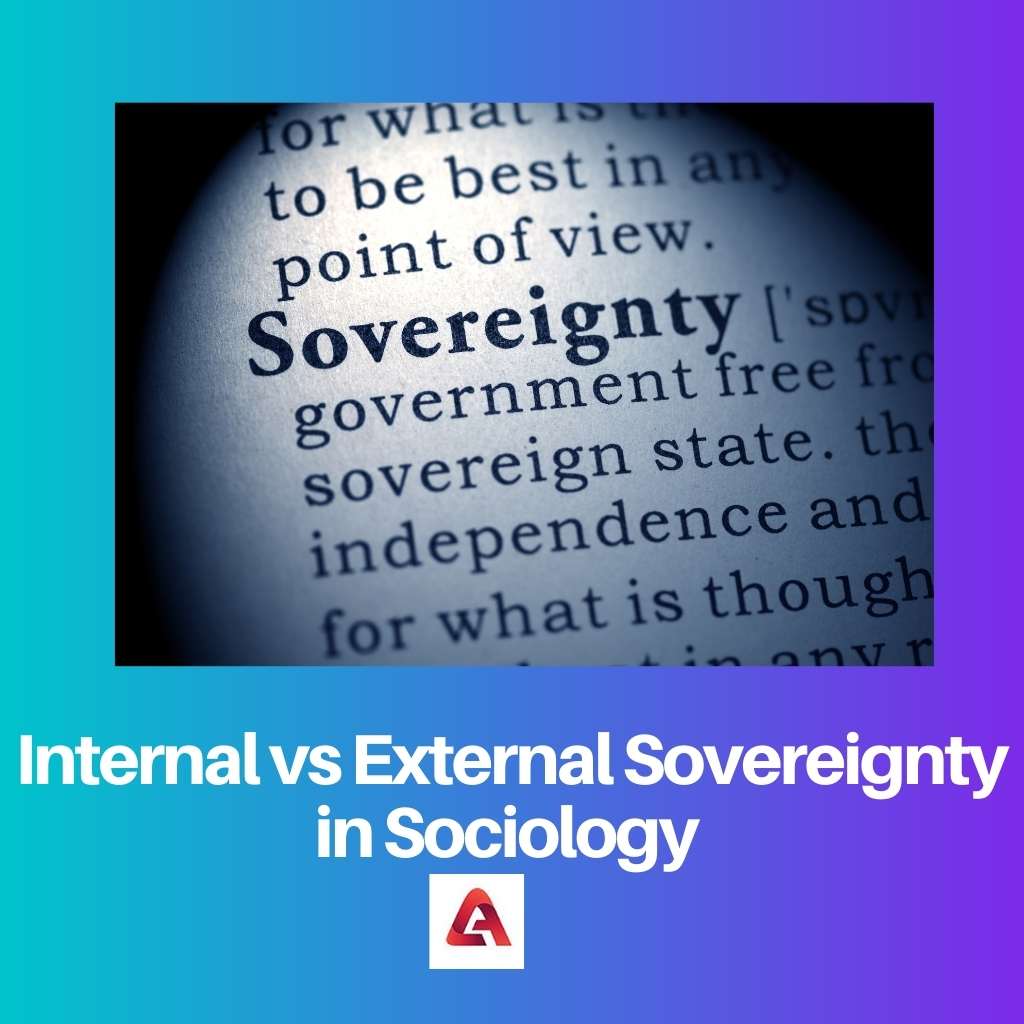Sovereignty has a basic meaning, a supreme authority inside a territory, though its definitions have changed over time. It’s a contemporary concept of political power.
Even as Blackstone articulated it, sovereignty is simply the authority to establish laws. The term also connotes autonomy; having sovereign power means being immune to outside interference.
Key Takeaways
- Internal sovereignty refers to a government’s authority and control over its population and territory, while external sovereignty relates to a state’s independence and recognition by other states.
- Internal sovereignty is essential for maintaining social order, while external sovereignty ensures a state’s ability to conduct international relations.
- A state may have external sovereignty but lack internal sovereignty due to internal conflicts or weak governance.
Internal vs External Sovereignty in Sociology
The difference between internal and external sovereignty in sociology is that internal sovereignty refers to the relationship between the sovereign state and the citizens of the state. On the other hand, external sovereignty is the relationship between a sovereign state and the other states. In internal sovereignty, no other state can influence their laws, while in external sovereignty, other states may involve.

Internal sovereignty is the state’s ultimate power over all people and organizations under its jurisdiction. The relationship between the sovereign power and its subjects is described by internal sovereignty.
Internal sovereignty is a parliament that is elected and voted by the people. The purpose of internal sovereignty is to maintain peace, law, and order.
External sovereignty means independence or freedom from interference, not just concerning any potential higher authority, such as an international or supranational body, but also for foreign nations.
It refers to the freedom of self-governance. External sovereignty, like independence, refers to the right to rule oneself. No external forces can influence their decisions.
Comparison Table
| Parameters of Comparison | Internal Sovereignty in Sociology | External Sovereignty in Sociology |
|---|---|---|
| Definition | Internal Sovereignty is the authority of a state to authorize within its territory. | External sovereignty is the ability to defend itself against other states. |
| Involves | Between State and citizens | Between State and State |
| Rights | Rights of self- freedom of the citizens | Rights of freedom from external forces, etc. |
| Affairs | Internal affairs within the state (nationally) | External affairs with the other states (internationally) |
| Example | For eg: United Kingdom Parliament | For eg: India- after its independence (1947) |
What is Internal Sovereignty in Sociology?
Internal sovereignty describes the relationship between sovereign authority and its subjects. Also, the position of the state’s sovereign power is expressed.
Internal sovereignty rests with Parliament in the United Kingdom, as represented in the fundamental concept of parliamentary democracy. It looks around the internal affairs as well as the public welfare.
This authority is essential for making people live happily and peacefully without disruption. When there is a lack of internal sovereignty, the superior powers will weaken the authority and disrupt the peace.
Their existence enables you to keep the agreement and impose consequences for legal violations. Internal sovereignty is expressed by leadership’s capacity to prevent such abuses.
Internal sovereignty helps the leaders to test their leadership abilities. An internal sovereign is a political entity with ultimate, final, and autonomous sovereignty, with judgments binding on all persons, groups, and institutions.
Early, all the thinkers thought that a single person can take authority. The emergence of democracy put significant constraints on the sovereign’s and ruling classes’ authority.
Citizens and officials have long understood that there can be no peace without law and that there can be no law without some form of sovereignty limitation.
What is External Sovereignty in Sociology?
External sovereignty refers to a state’s ability to defend itself against external assault. Even if attacked, the afflicted state will be entitled to lodge a protest with the United Nations and request assistance from the UN by claiming foreign sovereignty.
The state’s external authority means free of government power or internal state control. Another state’s will and control are eliminated from one state.
In simple words, it is defined, as free from any external control. External sovereignty has all the rights to make relationships, treaties with other countries.
No other country, state, or external power can force a state’s external sovereignty. If a state strives to exert ultimate authority outside its borders, it will be associated with imperialist ambitions.
External sovereignty includes the capacity to establish diplomatic relations with other sovereign states and to formulate foreign policy appropriately. For example, India became an external sovereign nation after its independence in 1947.
Sovereignty is defined in ways, including legal and non-legal justifications. In truth, each area or country defines sovereignty in its unique way.
Despite this, a country’s authority is known and established by examination of the country’s internal and external circumstances.
External sovereignty has all the rights to make relationships, treaties with other countries. No other country, state, or external power can force a state’s external sovereignty.
For example, India became an external sovereign nation after its independence in 1947.
Main Differences Between Internal and External Sovereignty in Sociology
- Internal sovereignty is the power to govern or authorize a nation/state. External sovereignty is the freedom to govern a country/state.
- A particular ruler takes up the authority to rule the state, whereas, in external sovereignty, democratic government is there.
- In an internal sovereign country, people don’t have the freedom of choosing their leader. In an external sovereign country, people have freedom of choice to elect the leader.
- In an internal sovereign country, it rules within the territory. In an external sovereign country, no other state or nation can disrupt the peace.
- Internal sovereignty refers to the relationship between the sovereign state and the citizens. External sovereignty refers to the relationship between the sovereign state and other states.






